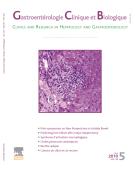Screening by anti-endomysium antibodies for celiac disease in Tunisian children with type 1 diabetes mellitus - 23/04/08

Summary |
Aim |
Celiac disease (CD) and type 1 diabetes mellitus (DM1) can frequently coexist, presumably due to a common genetic predisposition. The present study was designed to evaluate the frequency of CD among Tunisian children with DM1.
Patients and methods |
A total of 205 diabetic children (92 girls, 113 boys, age range 6 months-15 years, median 11 years) were screened for CD by determination of IgA anti-endomysium antibodies (EMA).
Results |
EMA were positive in 17 out of 205 (8.3%) children with DM1. The median age of DM1 at onset was significantly lower in patients with EMA than those without EMA (P<10-7). In 13 of 17 EMA-positive patients, duodenal biopsy could be performed and a destructive type of CD was confirmed in 11 of them: 8 patients showed total villous atrophy, 3 patients showed a partial villous atrophy. The other two patients showed a normal histological picture with normal number of intraepithelial lymphocytes. Parents of the remaining EMA-positive children refused endoscopy. Thus the prevalence of biopsy-proven CD was 5.3% (11/205). It was 7.6% (7/92) in girls and 3.5% (4/113) in boys but the difference was not statistically significant. Seventy three percent of patients with CD were asymptomatic.
Conclusions |
The prevalence of clinically unrecognized CD, found by EMA screening, is high in Tunisian children with DM1. We suggest that children with diabetes should be screened for CD.
Il testo completo di questo articolo è disponibile in PDF.Résumé |
Objectif |
Déterminer la prévalence de la maladie cœliaque (MC) chez des enfants tunisiens atteints de diabète de type 1.
Malades et méthodes |
Notre étude a porté sur 205 sérums de malades atteints de diabète de type 1 (92 filles, 113 garçons, extrêmes d’âge : 6 mois-15 ans, âge median : 11 ans). Le dépistage de la MC a été réalisé par la recherche des anticorps anti-endomysium d’isotype IgA (AAE).
Résultats |
Dix-sept enfants parmi 205 avaient des AAE (8,3 %). L’âge médian au moment du diagnostic du diabète était significativement plus faible chez les malades ayant des AAE que chez ceux n’ayant pas d’AAE (P < 10-7). Treize malades parmi les 17 ont eu une biopsie duodénale : 8 malades avaient une atrophie villositaire totale, 3 malades avaient une atrophie villositaire partielle. Les deux autres avaient une muqueuse normale et un nombre normal de lymphocytes intra-épithéliaux. Les parents des autres malades ayant des AAE ont refusé l’endoscopie. La prévalence de la MC confirmée par la biopsie était de 5,3 %. Elle était de 7,6 % (7/92) chez les filles et 3,5 % (4/113) chez les garçons mais la différence n’était pas significative. Soixante-treize pour cent des malades cœliaques étaient asymptomatiques.
Conclusion |
La MC est fréquente chez les enfants tunisiens atteints de diabète de type 1. Ces résultats incitent à proposer un dépistage systématique de la MC chez tout enfant atteint de diabète de type 1.
Il testo completo di questo articolo è disponibile in PDF.Mappa
Vol 31 - N° 5
P. 462-466 - Maggio 2007 Ritorno al numeroBenvenuto su EM|consulte, il riferimento dei professionisti della salute.

